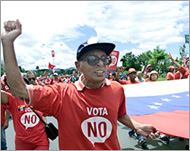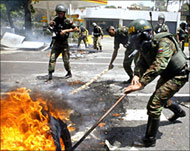Chavez: Despot or poor’s champion?
When the Bush administration gave its blessings to a 2002 coup which temporarily unseated him, Venezuelan President Hugo Chavez described the US president as a rear body part.

The national reaction to this outburst was indicative of how the ex-soldier divides his nation along class and racial lines.
The rural poor loved it – here was the president of their country speaking in a language they understood.
But others, principally among the country’s white, middle-class elite, took it as yet another example of what they see as Chavez’s recklessness.
“Vulgar showman”, “neo-Marxist autocrat”, “populist champion” and “narcissistic buffoon”, Chavez has been called all these and more during his six years in power.
For the elite which has traditionally run Venezuela, he is the devil incarnate, intent on turning the country into a communist state.
But for many among Venezuela’s poor majority, Chavez is the tarnished saviour who represents their best hope of a decent life.
On Sunday, a polarised nation will deliver its verdict on the president in a national referendum on his rule.
Military man
Hugo Chavez was born in 1954 to school teacher parents.
In 1971, he won admission to the country’s military academy and began a rapid assent up the ranks.
It was in the army that he joined forces with other officers disenchanted with Venezuela’s political parties and resentful of what they labelled the country’s demeaning subservience to the US.
 |
|
Supporters of Chavez have been |
By the early 1980s the officers had set up the Bolivian Revolutionary Movement with the intention of “liberating” Venezuela, and even the rest of Latin America, from the American yoke.
In 1992, as economic crisis and social unrest gripped the country, Chavez made his first attempt to seize power as a colonel at the head of a coup aimed at toppling the then president, Carlos Andres Perez.
But the plot failed and a repentant Chavez was imprisoned.
Six years later, however, he waged a legitimate campaign for the country’s highest office, charmed the electorate, and was duly elected in a landslide victory.
America-baiting
Once in office Chavez used his country’s membership of OPEC to push for a boost in world oil prices in order to garner revenues to pay for social programmes.
In doing so, he signalled his country would no longer be beholden to the US.
 |
|
Opposition activists are mainly |
Then there was the America-baiting. He enraged the US by making official visits to Libya and Iraq, hobnobbing with Cuba’s Fidel Castro, and floating the idea of fixing oil prices in euros instead of dollars.
The US, which is heavily dependent on Venezuelan oil, was not amused.
Redistribution of wealth
According to local government and international data, nearly 48% of Venezuelans are considered at the poverty level, while another 32% are considered living beneath the poverty line. Consequently, most Venezuelans suffer from a lack of sustainable nourishment.
With an eye on the needs of the poor, Chavez has since 1998 embarked on an ambitious programne of wealth redistribution.
He has provided social welfare programmes to the poor, created jobs and raised the taxes on the more affluent sectors of society.
To the majority of Venezuelans – mainly the impoverished – Chavez became a hero.
Another feature of Chavez’s time in office has been his eccentricity, symbolised by his curious weekly television show, Alo Presidente.
In the show he is demagogic, cajoling, bullying, threatening, vulgar and silly. He sings, cracks jokes, lambasts his political enemies and even quotes from the Bible.
The poor love it, but the rich grimace with embarrassment.
‘Mixed record’
Larry Birns, director of the Washington-based Council on Hemispheric Affairs (COHA), told Aljazeera.net that Chavez has a mixed record in office.
“Chavez is great at seeing the big picture and a great articulator of just causes,” he said.
|
“Chavez is great at seeing the big picture and a great articulator of just causes. But with the bread and butter issues, like filling potholes in roads, he has let people down. Great visionaries are rarely great administrators” Larry Birns, |
“But with the bread-and-butter issues, like filling potholes in roads, he has let people down. Great visionaries are rarely great administrators.”
Birns says Chavez has particularly reneged on his pledges to improve living standards for the poor.
Under his controversial rule, the number of people living in poverty has increased and per capita income has dropped.
“Venezuelan presidents are great at making promises but they never deliver,” said Birns.
“Chavez has fought too many battles on too many fronts. He has taken on all of his political opponents simultaneously and the result has been the country has been paralysed to a certain extent.”
Past failures
In hindsight, analysts say the president’s failure to appease all his opponents led to the April 2002 coup which temporarily unseated him.
“There are continued reports of widespread unlawful killings and torture of criminal suspects by the police” Amnesty International report on human rights in Venezuela |
The background was familiar – an economy in disarray, discontent in parts of the military, and a devastating strike at the national oil company.
Senior military officers forced Chavez to step down and Washington, which had indirectly funnelled money to his opponents, welcomed the development as “a victory for democracy”.
But as thousands of Chavez supporters poured onto the streets, his opponents’ nerve cracked and he was back in the presidential palace within 50 hours.
The respite was brief. As the economy shrank further, strikes and mass protests once again became the norm.
The poor began to abandon their one-time champion as the economy took its toll on programmes that once favoured them.
Earlier this year, Venezuela’s opposition obtained enough signatures to trigger a referendum on the rule of Chavez, saying his autocratic style had forced them to petition for a recall vote.
They achieved this in spite of what analysts described as Chavez’s attempts to stave off a referendum by manipulating the process in his favour.
The oil gambit
Nevertheless, Chavez has proven agile in milking his most powerful economic and political weapon – oil revenues.
Since he pushed for greater OPEC strength in 2002 and helped keep oil prices relatively high, Chavez has enjoyed a revival of sorts.
When oil prices continued their upward spiral in 2003, Chavez regained some support.
The additional funds are going into food subsidies, better health services and accessible education.
COHA’s Birns says he would be astonished if Chavez lost the recall vote.
“With oil prices reaching $44 a barrel, he has been able to spend nearly $2 billion on social programmes. I think he has built up an unstoppable momentum now.”
Human rights
Despite such recent gains, Chavez’s human-rights record is still criticised in some quarters.
In a recent report on Venezuela, rights group Amnesty International said “there were continued reports of widespread unlawful killings and torture of criminal suspects by the police”.
Amnesty added that “there were reports of harassment of journalists” in the country.
 |
|
The Venezuelan leader continues |
But COHA’s Birns says Chavez is a “third-rate human rights violator” at best.
“There have been attacks on the media and reports of security violations, but compared to the murders that are happening in places like Mexico and Argentina, he is not that bad. There are no political prisoners languishing in jails in Venezuela.”
Referendum
Opinion polls give Chavez a slight lead in the recall vote with a significant proportion of the electorate undecided.
His lead may be down to a raft of new social programmes for the poor funded by rising oil revenues.
He can also count on the support of legions of recently naturalised immigrants who see him as their political saviour.
 |
|
Venezuela’s economy has been |
But Birns warns: “If he wins there will be a mass exodus of the middle classes to Miami. The Venezuelan population there will double from the 200,000 people there at present.
“They will leave not because they are being persecuted but because Venezuela will no longer be a nation for the middle classes.”
The referendum on Sunday could now be a political watershed.
Venezuela could begin to mend its fractured political system or the result could further incite the political warfare that has practically paralysed it.
Enigma
Birns says it is quite plausible that certain members of the opposition will not accept the result.
Particularly worrying are comments by ex-president Carlos Andres Perez, who has called for a resort to force to overthrow Chavez in the event of the opposition losing the election.
|
“I was overwhelmed by the feeling that I had just been with two opposing men. One to whom the caprices of fate had given an opportunity to save the country. The other an illusionist who could pass into the history books as just another despot” Gabriel Garcia Marquez, |
According to Perez, Chavez “must die like a dog, because he deserves it”.
“It is feasible that the middle class and discontented members of the military will join alliance and make trouble for Chavez,” said Birns.
“They may even start a guerrilla war. So I think he has to extend an olive branch to the middle-class opposition now if Venezuela is to move on from being an embattled state.”
As the referendum approaches, the jury is clearly still out on Chavez. Win or lose, he remains an enigma.
After celebrated Colombian author Gabriel Garcia Marquez met Chavez in 1999, he summed up the feelings of many.
“I was overwhelmed by the feeling that I had just been with two opposing men,” he wrote.
“One to whom the caprices of fate had given an opportunity to save the country. The other, an illusionist who could pass into the history books as just another despot.”